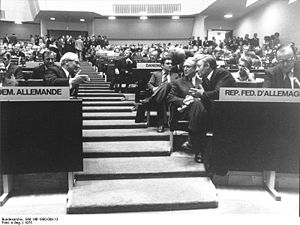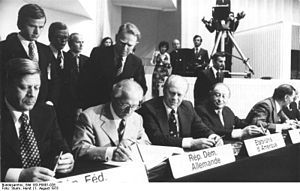- Helsinki Accords
-
For the set of principles on human experimentation, see Declaration of Helsinki.
 Erich Honecker (GDR, left) and Helmut Schmidt (FRG) in Conference on Security and Co-operation in Europe held in Helsinki 1975.
Erich Honecker (GDR, left) and Helmut Schmidt (FRG) in Conference on Security and Co-operation in Europe held in Helsinki 1975.
The Helsinki Final Act, Helsinki Accords or Helsinki Declaration was the final act of the Conference on Security and Co-operation in Europe held in Helsinki, Finland, during July and August 1,1975. Thirty-five states, including the USA, Canada, and all European states except Albania and Andorra, signed the declaration in an attempt to improve relations between the Communist bloc and the West.
Contents
Articles
The Act's "Declaration on Principles Guiding Relations between Participating States" (also known as "The Decalogue") enumerated the following 10 points:
- Sovereign equality, respect for the rights inherent in sovereignty
- Refraining from the threat or use of force
- Inviolability of frontiers
- Territorial integrity of States
- Peaceful settlement of disputes
- Non-intervention in internal affairs
- Respect for human rights and fundamental freedoms, including the freedom of thought, conscience, religion or belief
- Equal rights and self-determination of peoples
- Co-operation among States
- Fulfilment in good faith of obligations under international law
Reception and impact
The document was seen both as a significant step toward reducing Cold War tensions and as a major diplomatic boost for the Soviet Union at the time, due to its clauses on the inviolability of national borders and respect for territorial integrity, which were seen to consolidate the USSR's territorial gains in Eastern Europe following the Second World War. Considering objections from Canada, Spain, Ireland and other states, the Final Act simply stated that "frontiers" in Europe should be stable, but those borders could be changed by peaceful means.[1]:65 U.S. President Gerald Ford also reaffirmed that US non-recognition policy of the Baltic states' (Lithuania, Latvia and Estonia) forced incorporation into the Soviet Union had not changed.[2] Leaders of other NATO member states made similar statements.[1]:65
However, the civil rights portion of the agreement provided the basis for the work of the Moscow Helsinki Group, an independent non-governmental organization created to monitor compliance to the Helsinki Accords (which evolved into several regional committees, eventually forming the International Helsinki Federation and Human Rights Watch). While these provisions applied to all signatories, the focus of attention was on their application to the Soviet Union and its Warsaw Pact allies, including Bulgaria, Czechoslovakia, the German Democratic Republic (East Germany), Hungary, Poland, and Romania. Soviet propaganda presented the Final Act as a great triumph for Soviet diplomacy and for Brezhnev personally.[1]:65
According to the Cold War scholar John Lewis Gaddis in his book "The Cold War: A New History" (2005), "Leonid Brezhnev had looked forward, Anatoly Dobrynin recalls, to the 'publicity he would gain... when the Soviet public learned of the final settlement of the postwar boundaries for which they had sacrificed so much'... '[Instead, the Helsinki Accords] gradually became a manifesto of the dissident and liberal movement'... What this meant was that the people who lived under these systems — at least the more courageous — could claim official permission to say what they thought."
 Chancellor of Federal Republic of Germany (West Germany) Helmut Schmidt, Chairman of the Council of State of the German Democratic Republic (East Germany) Erich Honecker, U.S. president Gerald Ford and Austrian chancellor Bruno Kreisky
Chancellor of Federal Republic of Germany (West Germany) Helmut Schmidt, Chairman of the Council of State of the German Democratic Republic (East Germany) Erich Honecker, U.S. president Gerald Ford and Austrian chancellor Bruno Kreisky
The Helsinki Accords served as the groundwork for the later Organization for Security and Cooperation in Europe (OSCE), established under the Paris Charter.
Signatory states
In French alphabetical order
 Federal Republic of Germany
Federal Republic of Germany German Democratic Republic
German Democratic Republic United States of America
United States of America Austria
Austria Belgium
Belgium Bulgaria
Bulgaria Canada
Canada Cyprus
Cyprus Denmark
Denmark Spain
Spain Finland
Finland France
France United Kingdom
United Kingdom Greece
Greece Hungary
Hungary Republic of Ireland
Republic of Ireland Iceland
Iceland Italy
Italy Liechtenstein
Liechtenstein Luxembourg
Luxembourg Malta
Malta Monaco
Monaco Norway
Norway Netherlands
Netherlands Poland
Poland Portugal
Portugal Romania
Romania San Marino
San Marino Holy See
Holy See Sweden
Sweden Switzerland
Switzerland Czechoslovakia
Czechoslovakia Turkey
Turkey Union of Soviet Socialist Republics
Union of Soviet Socialist Republics Yugoslavia
Yugoslavia
Heads of states, heads of governments and leaders of ruling parties
- Helmut Schmidt Chancellor of the Federal Republic of Germany
- Erich Honecker Chairman of the Council of State of the German Democratic Republic
- Bruno Kreisky Chancellor of Austria
- Leo Tindemans Prime Minister of Belgium
- Todor Zhivkov Chairman of the State Council of Bulgaria
- Pierre Trudeau Prime Minister of Canada
- Makarios III President of the Republic of Cyprus
- Anker Jørgensen Prime Minister of Denmark
- Carlos Arias Navarro Prime Minister of Spain
- Urho Kekkonen President of Finland
- Valéry Giscard d’Estaing President of France
- Gerald Ford President of the United States of America
- Harold Wilson Prime Minister of United Kingdom
- Konstantinos Karamanlis Prime Minister of Greece
- János Kádár Chairman of the Council of Ministers of the People's Republic of Hungary
- Liam Cosgrave Prime Minister of Ireland
- Geir Hallgrímsson Prime Minister of Iceland
- Aldo Moro Prime Minister of Italy
- Walter Kieber Prime Minister of Liechtenstein
- Gaston Thorn Prime Minister of Luxembourg
- Dom Mintoff Prime Minister of Malta
- André Saint-Mleux Minister State of Monaco
- Trygve Bratteli Prime Minister of Norway
- Joop den Uyl Prime Minister of the Netherlands
- Edward Gierek First Secretary of the Polish United Workers' Party
- Francisco da Costa Gomes President of Portugal
- Nicolae Ceauşescu President of Romania
- Gian Luigi Berti Captain Regent of San Marino
- Agostino Casaroli Cardinal Secretary of Holy See
- Olof Palme Prime Minister of Sweden
- Pierre Graber President of the Swiss Confederation
- Gustáv Husák President of Czechoslovakia
- Süleyman Demirel Prime Minister of Turkey
- Leonid Brezhnev General Secretary of the Communist Party of the Soviet Union
- Josip Broz Tito President of the Socialist Federal Republic of Yugoslavia
Absent
- Joan Martí Alanis Co-Prince of Andorra and Bishop of Urgell
- Enver Hoxha First Secretary of the Albanian Party of Labour
References
- ^ a b c Hiden, John; Vahur Made, David J. Smith (2008). The Baltic question during the Cold War. Routledge. p. 209. ISBN 0415371007.
- ^ McHugh, James T.; James S. Pacy (2001). Diplomats without a country: Baltic diplomacy, international law, and the Cold War. Greenwood Publishing Group. p. 84. ISBN 9780313318788.
External links
- Full text of the Final Act, 1975 Conference on Security and Co-operation in Europe
- United States Helsinki Commission
- Signing of the Final Act on August 1st 1975
- OSCE Magazine October 2005: celebrating the 30th anniversary of the Helsinki Accords
- The Helsinki process and the death of communism
Categories:- Cold War treaties
- History of Helsinki
- 1975 in Finland
- Treaties of the Soviet Union
- Treaties concluded in 1975
- 1975 in the European Economic Community
- 1975 in international relations
Wikimedia Foundation. 2010.

